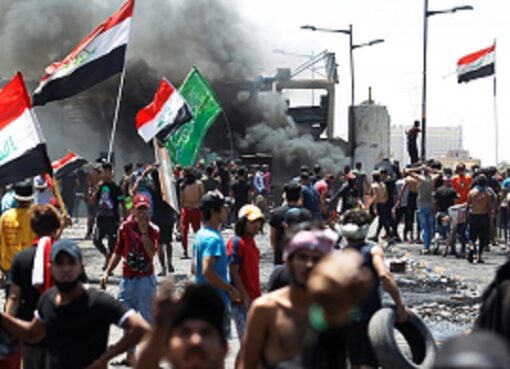Washington’s ever-narrowing Iraq policy has left it with unpalatable choices, but muddling through is a better short-term option than allowing the relationship to rupture.
raq is back in the headlines, and once again for all the wrong reasons. On January 28, an Iraqi militia attack in Jordan killed three American service members and injured dozens more, moving the situation another step up the ladder of escalation that emerged late last year. First, the Gaza war ended a months-long lull in militia attacks against U.S. targets inside Iraq, spurring pro-Iran groups under the umbrella of the “Islamic Resistance in Iraq” to begin a new wave of attacks that numbered 180 at last count. In response, U.S. forces carried out strikes against designated terrorist figures in Baghdad, reawakening the anti-American political choir and its refrain of formally removing the U.S. military presence.
In stark contrast to its past assurances about de-escalation in Iraq, the Biden administration is now promising to punish the perpetrators of the Jordan attack. The question is how and where. Unless Washington breaks with its longstanding pattern and unwritten rules of engagement with Tehran, it will not attack Iran directly. Yet the recent U.S. tactic of targeting Iranian assets in Syria would not send a strong enough message to deter Tehran or appease angry Americans stateside. Iraq seems like a more convenient stage for U.S. military action, as seen in January 2020 when Washington ordered strikes on Iranian general Qasem Soleimani and Iraqi militia leader Abu Mahdi al-Muhandis in Baghdad.
Whatever course it chooses, the administration will need to factor in the potential effects on U.S.-Iraq relations. In that regard, the decision appears to be a choice between two tough scenarios: muddling through or allowing the relationship to rupture.
Rupture
In the most extreme scenario, the U.S.-Iraq relationship irreparably implodes, and Iranian diktat prevails over Iraqi agency. One potential path to this outcome is unconstrained escalation. When Iran-backed militias stepped up their attacks late last year, the initial U.S. response was a mix of diplomatic pressure and measured military action (usually in Syria), as Washington tried to avoid escalating the violence or upsetting Iraq’s delicate political and economic situation. As attacks mounted and the Iraqi government did nothing, the United States shifted to attacking targets inside Iraq, striking the militia stronghold of Jurf al-Sakhar and killing a Kataib Hezbollah commander in Baghdad. The Jordan base attack could spur more—and more intense—U.S. operations.
Meanwhile, the Iraqi government further damaged the relationship earlier this month by joining the chorus of calls to kick U.S. forces out. Additional military action would likely amplify such calls. It might also spur some militias to turn their rockets and drones against the U.S. embassy in Baghdad and consulate in Erbil—targets they have mostly spared. The government would then be essentially sidelined as U.S. and militia forces resort to escalating tit-for-tat exchanges, potentially leading to a complete diplomatic breakdown.
The last time the two countries faced a rupture was in 2020, when the United States responded to a wave of militia attacks by killing Soleimani and Muhandis. Subsequently, Iran fired ballistic missiles at U.S. forces stationed at al-Asad Air Base. To halt that cycle of escalation, the Trump administration threatened to withdraw its forces under duress and shutter the embassy, arguing that it could not trust Iraqi forces to protect its diplomats.
The 2020 threat was a potent one and could give the Biden administration leverage today—whether to save the relationship or, failing that, create better conditions for targeting Iranian and militia interests. Abruptly withdrawing U.S. forces amid active hostilities would have a domino effect on other members of the anti-Islamic State (IS) coalition who still have a presence in Iraq. Moreover, once its personnel are out of the line of fire, the United States would have fewer qualms about attacking Iraqi militias, sanctioning Iraqi business and government entities, canceling the waivers that allow Baghdad to purchase Iranian electricity and natural gas, or cutting off the flow of U.S. dollars—a move that could collapse Iraq’s currency.
Washington has long shied away from sanctioning government agencies and state-run companies, but the Treasury Department’s recent designation of the airline Fly Baghdad brings it closer to crossing that line. The last time the government faced sanctions—after Saddam Hussein invaded Kuwait—Iraq’s economy collapsed. The country has not built enough economic resilience to withstand sanctions today, nor would Tehran come to its aid.
Ultimately, however, rupture is a lose-lose scenario for both countries. Staying in Iraq may not exactly be a “win” for Washington, but leaving would produce significant losses in reputation, interests, and power. If the United States withdraws, Prime Minister Mohammed Shia al-Sudani’s government would soon fall. Iran-backed militias would then take over the state in full, likely concluding that they no longer need a “neutral” prime minister to balance Iraq’s complex relations with Washington. Internal fissures would come to the fore, potentially driving violence both inside the “resistance” and against Iraqi Kurdistan. Such chaos would of course be fertile ground for the reemergence of an IS insurgency—especially since Washington and Baghdad would no longer have the benefit of intelligence sharing on the group. Leaving Iraq would also make logistical support for the U.S. counterterrorism mission in Syria more onerous and costly.
Muddle Through
The second option would essentially be a return to the status quo ante: the de facto truce that prevailed before Iran reactivated its proxy network during the Gaza war. The feasibility of this scenario may depend on how soon that war’s main combat phase ends, though at least one top militia—Kataib Hezbollah—has declared a willingness to halt attacks regardless of what happens in Gaza, presumably fearing a major U.S. response to the Jordan attack. Additional de-escalation may unfold if the Biden administration’s warnings deter the militias further, or if they suffer a nosebleed via U.S. military action; in either case, the Iraqi government may have enough room to assert its authority over security matters.
Washington and Baghdad would then have to muddle through a messy diplomatic and political situation, preserving the relationship by saving face and buying time. This could enable each of them to meet their basic objectives: namely, keeping U.S. forces in Iraq under reframed terms that help Baghdad appease the militias and their Iranian backers.
To make this scenario work, however, Iraqi officials will need to sort out the discrepancies between their private expectations and public posture. For instance, Kurdish parties want the U.S.-led coalition to continue fighting IS but have shied away from openly and collectively supporting its presence. Sunni parties have their own fears about a U.S. departure but are loath to express them loudly. In contrast, Shia parties are openly embracing the prospect while relishing their control over institutions in Baghdad, where power has been greatly recentralized over the years.
Prime Minister Sudani appears to be seeking a middle ground, balancing hardline anti-American voices in his coalition with more pragmatic voices that want to keep the financial perks of a U.S. footprint without the security pricks. To appease both camps, he has called for dispersing the anti-IS coalition while negotiating bilateral deals with its member states. As Iraq’s commander-in-chief, he has the authority to simply ask the coalition to leave; instead, he formed a committee on the matter and led discussions in Baghdad last week, signaling his desire to calm the situation and take a collective approach to shaping the next phase of the security relationship.
Avoiding the Worst Outcomes
Iran’s main goal has not changed: it wants to force the U.S. military out of the Middle East. In Iraq, its strategy for achieving this goal has been discouragingly successful: using armed proxies to keep U.S. officials focused on force protection and prevent them from defending America’s local allies. As a result, Washington is left without any Iraqi partners who are able and willing to stand up for the United States in the face of Iran’s diktats. Even if U.S. forces manage to stay this time, the conditions for eventual rupture have been set, particularly if U.S. domestic pressure mounts for withdrawal. A similar dynamic is at work in Syria.
In the past, de-escalation bought Washington time, but de-escalation alone is no foundation for a healthy relationship. If anything, it just gave Iran-backed militias more space to intimidate opponents, overturn election results, and sink their talons into the Iraqi government and economy. On the ground, America’s friends saw that Washington had few reservations about letting designated terrorist groups run ministries or attack the Kurdistan Region, energy companies, and civil society. Iraqis and others in the region realize that militias pose the biggest threat since IS—yet unlike with IS, the United States has no coherent strategy against the militias.
These armed groups are now in position to gain full control over Iraq unless the United States holds Baghdad to greater account on containing them and protecting U.S. personnel. Some of the militias with the most violent backgrounds (e.g., the Badr Organization and Asaib Ahl al-Haq) have shied away from attacking U.S. forces, due in large part to their oversize role in government. Yet the three groups responsible for most of the attacks—Kataib Hezbollah, Harakat Hezbollah al-Nujaba, and Kataib Sayyid al-Shuhada—are now holding the entire government hostage.
For years, Washington has pursued ever-narrowing interests in Iraq, and they now boil down to simply supporting the mission against IS. This dilution has rendered the U.S. presence ineffective in the eyes of friends and foes alike. Yet withdrawing would risk even greater instability, so muddling through is the wisest objective in the current context of regional turmoil and U.S. election campaigning. In the longer term, Washington’s Iraq policy will continue to deteriorate without a comprehensive strategy to deter Iran and its militias. That said, the onus is now on Baghdad to save this relationship, since Washington may decide to walk away rather than invest more effort in such a troublesome partner.
Bilal Wahab is the Wagner Fellow at The Washington Institute and author of its recent study “Family Rule in Iraq and the Challenge to State and Democracy.”
Source: The Washinton Institute for Near East Studies
Two Tough Scenarios for U.S.-Iraq Relations | The Washington Institute








Comment here